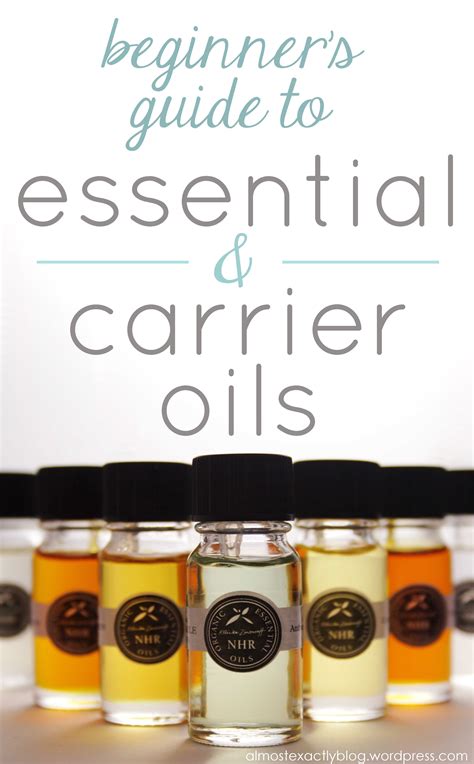Introduction
Essential oils are highly concentrated plant extracts that offer a wide array of therapeutic benefits. However, their potency can be overwhelming and even irritating to the skin when applied directly. That’s where carrier oils come in – they dilute and disperse essential oils, making them safe and suitable for topical use. In this comprehensive guide, we delve into the world of essential oil carrier oils, exploring their types, benefits, and best applications.

Types of Essential Oil Carrier Oils
There are numerous carrier oils available, each with its unique properties and benefits. Some of the most popular types include:
- Jojoba Oil: Simulates skin’s natural sebum, making it ideal for all skin types, especially dry or acne-prone skin.
- Coconut Oil: Rich in fatty acids, coconut oil is highly moisturizing and anti-inflammatory.
- Almond Oil: Gentle and hypoallergenic, almond oil is suitable for sensitive skin and delicate areas like the face.
- Argan Oil: Known as “liquid gold,” argan oil is packed with antioxidants and essential fatty acids, making it a luxurious choice for nourishing the skin.
- Grape Seed Oil: Light and non-greasy, grape seed oil is rich in antioxidants and has excellent skin-firming properties.
Benefits of Essential Oil Carrier Oils
In addition to diluting essential oils, carrier oils offer numerous benefits on their own:
- Moisturizing: Carrier oils are emollient, meaning they soften and smooth the skin. They create a protective barrier that locks in moisture, preventing dryness and flakiness.
- Nourishing: Packed with essential nutrients, carrier oils nourish the skin, providing vitamins, minerals, and antioxidants.
- Antioxidant protection: Many carrier oils are rich in antioxidants that combat free radicals, protecting the skin from damage and premature aging.
- Anti-inflammatory: Certain carrier oils, such as coconut oil and argan oil, have anti-inflammatory properties that can soothe skin irritation and conditions like eczema.
- Carrier for essential oils: Carrier oils make essential oils safe and effective for topical application by diluting their potency and enhancing their absorption.
Best Applications for Essential Oil Carrier Oils
Essential oil carrier oils have a wide range of applications, including:
- Skincare: Carrier oils are a staple in skincare routines, providing moisture, nourishment, and protection. They can be used in cleansers, moisturizers, body oils, and face masks.
- Haircare: Carrier oils can be incorporated into hair care products to add shine, reduce frizz, and promote healthy hair growth. They can be used as pre-shampoo treatments, hair masks, or leave-in conditioners.
- Massage: Carrier oils are essential for massage therapy. They create a smooth, gliding surface and enhance the absorption of essential oils, providing both physical and emotional benefits.
- Aromatherapy: Carrier oils can be combined with essential oils and used in diffusers or baths to create a relaxing or energizing ambiance.
- Household cleaning: Carrier oils can be used as natural cleaning agents, combining with essential oils for a powerful yet eco-friendly solution.
How to Choose the Right Essential Oil Carrier Oil
When choosing an essential oil carrier oil, there are several factors to consider:
- Skin type: Different carrier oils are suitable for different skin types. For example, jojoba oil is ideal for all skin types, while coconut oil is best for dry or mature skin.
- Purpose: Consider the intended use for the carrier oil. For example, if you’re using it for skincare, you may want to choose an oil that is moisturizing and nourishing. If you’re using it for massage, you may want to choose an oil that is less greasy and has a neutral scent.
- Personal preference: Ultimately, the best carrier oil for you is the one that you find most comfortable and effective. Experiment with different oils until you find one that meets your needs and preferences.
DIY Essential Oil Carrier Oil Recipes
Creating your own essential oil carrier oil blend is a great way to customize your skincare or massage experience. Here are a few simple recipes to get you started:
- Moisturizing Body Oil: Combine 1 cup of jojoba oil, 1/2 cup of coconut oil, and 10 drops of lavender essential oil. Mix well and apply to damp skin.
- Relaxing Massage Oil: Combine 1/2 cup of almond oil, 1/4 cup of grape seed oil, and 10 drops of chamomile essential oil. Mix well and use for a calming massage.
- Invigorating Hair Mask: Combine 1/4 cup of coconut oil, 1/4 cup of olive oil, and 5 drops of rosemary essential oil. Mix well and apply to hair. Leave on for 30 minutes and then rinse.
Common Mistakes to Avoid
When using essential oil carrier oils, there are a few common mistakes to avoid:
- Not diluting essential oils: Always dilute essential oils in a carrier oil before applying them to the skin. Undiluted essential oils can be irritating and even harmful.
- Using the wrong carrier oil for your skin type: Not all carrier oils are suitable for all skin types. For example, coconut oil can be too heavy for oily or acne-prone skin.
- Overusing essential oils: Essential oils are highly concentrated, so a little goes a long way. Avoid using too much essential oil, as this can lead to skin irritation.
- Storing essential oils and carrier oils improperly: Essential oils and carrier oils should be stored in a cool, dark place away from direct sunlight. This will help preserve their quality and effectiveness.
FAQs
Here are some common questions about essential oil carrier oils:
- What is the difference between an essential oil and a carrier oil? Essential oils are highly concentrated plant extracts, while carrier oils are vegetable oils that are used to dilute and disperse essential oils.
- Is it safe to apply essential oils directly to the skin? No, essential oils should never be applied directly to the skin. They must be diluted in a carrier oil first.
- What is the best way to dilute essential oils? The best way to dilute essential oils is to add them to a carrier oil. The recommended dilution ratio is typically 2-5 drops of essential oil per 1 ounce of carrier oil.
-
How do I choose the right carrier oil for my skin type? The best carrier oil for your skin type depends on your individual needs and preferences. However, some general guidelines are as follows:
- Dry skin: Jojoba oil, coconut oil, almond oil
- Oily skin: Grape seed oil, argan oil
- Sensitive skin: Almond oil
